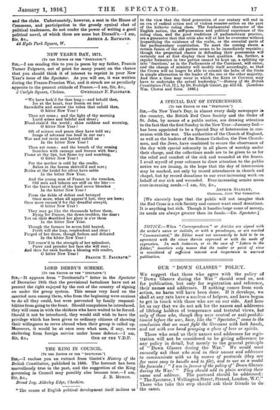THE BING IN COUNCIL
[To THE EDITOR OF THE " SPECTATOR-1 Sns,—I enclose you an extract from Gneist's History of the British Constitution, published in 1886. The forecast has, been marvellously true in the past, and the suggestion of the King governing in Council may possibly also become true.—I am,
Sir, &c., J. B. MOXON. Broad Ing, Alderley Edge, Cheshire.
" The course of English political development itself inclines us to the view that the third generation of our century will end in an era of radical action and of violent counter-action on the part of the hitherto ruling class. The fundamental character of the English nation, the self-possession and political experience of the ruling class, and the good traditions of parliamentary practice, are a guarantee that this crisis also will at last be overcome without jeopardizing the existence of the realm, or the essential parts of the parliamentary constitution. To meet the coming storm a certain fusion of the old parties seems to be immediately requisite ; though the propertied classes in defending their possessions will certainly not at first display their best qualities. As, further, • regular formation in two parties cannot be kept up, a splitting np into ' fractions,' as in the Parliaments of the Continent, will ensue, and the change of ministry will modify itself accordingly, so that the Crown will no longer be able to commit the helm of the State in simple alternation to the leader of the one or the other majority. And then a time may recur in which the Ktno Ix COUNCIL may have to undertake the actual leadership."—History of the British Constitution (VoL II.), by Dr. Rudolph Gneist, pp. 452-53. (Londoni Wm. Clowes and Sons. 1886.)










































 Previous page
Previous page